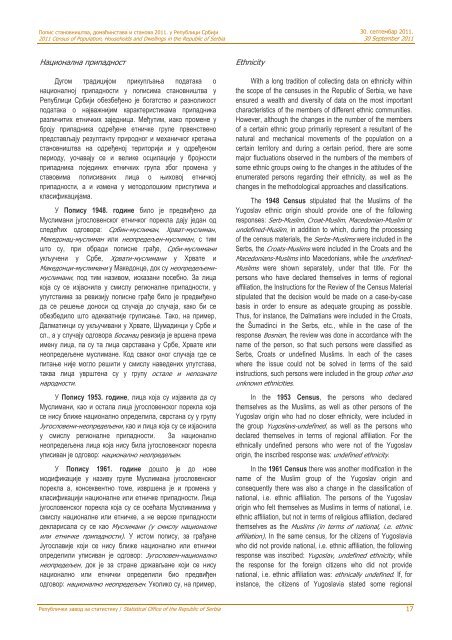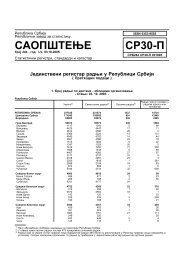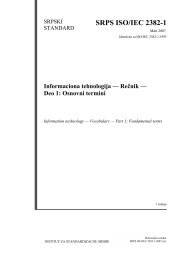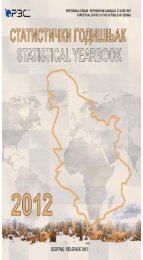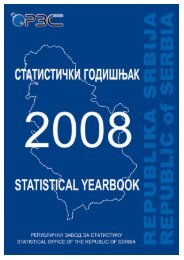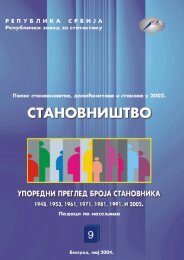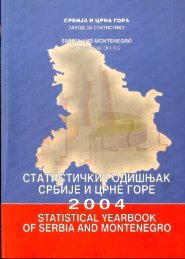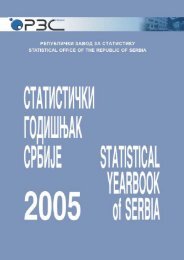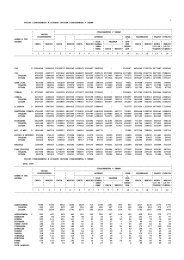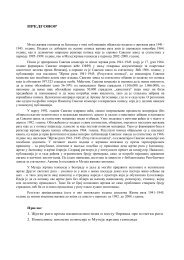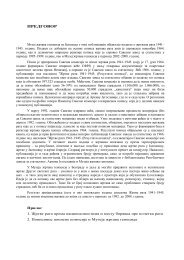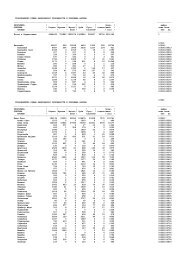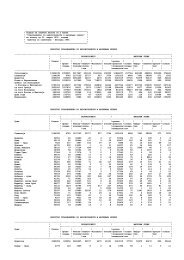Попис становништва, домаћинстава и станова 2011. у Републици Србији2011 Census of Population, Households <strong>and</strong> Dwellings in the Republic of Serbia30. септембар 2011.30 September 2011Национална припадностДугом традицијом прикупљања података онационалној припадности у пописима становништва уРепублици Србији обезбеђено је богатство и разноликостподатака о најважнијим карактеристикама припадникаразличитих етничких <strong>за</strong>једница. Међутим, иако промене уброју припадника одређене етничке групе првенственопредстављају резултанту природног и механичког кретањастановништва на одређеној територији и у одређеномпериоду, уочавају се и велике осцилације у бројностиприпадника појединих етничких група због промена уставовима пописиваних лица о њиховој етничкојприпадности, а и измена у методолошким приступима икласификацијама.У Попису 1948. године било је предвиђено даМуслимани југословенског етничког порекла дају један одследећих одговора: Србин-муслиман, Хрват-муслиман,Македонац-муслиман или неопредељен-муслиман, с тимшто су, при обради пописне грађе, Срби-муслиманиукључени у Србе, Хрвати-муслимани у Хрвате иМакедонци-муслимани у Македонце, док су неопредељенимуслимани,под тим називом, иска<strong>за</strong>ни посебно. За лицакоја су се изјаснила у смислу регионалне припадности, уупутствима <strong>за</strong> ревизију пописне грађе било је предвиђенода се решење доноси од случаја до случаја, како би сеобезбедило што адекватније груписање. Тако, на пример,Далматинци су укључивани у Хрвате, Шумадинци у Србе исл., а у случају одговора Босанац ревизија је вршена премаимену лица, па су та лица сврставана у Србе, Хрвате илинеопредељене муслимане. Код сваког оног случаја где сепитање није могло решити у смислу наведених упутстава,таква лица уврштена су у групу остале и непознатенародности.У Попису 1953. године, лица која су изјавила да суМуслимани, као и остала лица југословенског порекла којасе нису ближе национално определила, сврстана су у групуЈугословени-неопредељени, као и лица која су се изјаснилау смислу регионалне припадности. За националнонеопредељена лица која нису била југословенског пореклауписиван је одговор: национално неопредељен.У Попису 1961. године дошло је до новемодификације у називу групе Муслимана југословенскогпорекла а, консеквентно томе, извршена је и промена укласификацији националне или етничке припадности. Лицајугословенског порекла која су се осећала Муслиманима усмислу националне или етничке, а не верске припадностидекларисала су се као Муслимани (у смислу националнеили етничке припадности). У истом попису, <strong>за</strong> грађанеЈугославије који се нису ближе национално или етничкиопределили уписиван је одговор: Југословен-националнонеопредељен, док је <strong>за</strong> стране држављане који се нисунационално или етнички определили био предвиђенодговор: национално неопредељен. Уколико су, на пример,EthnicityWith a long tradition of collecting data on <strong>ethnicity</strong> withinthe scope of the censuses in the Republic of Serbia, we haveensured a wealth <strong>and</strong> diversity of data on the most importantcharacteristics of the members of different ethnic communities.However, although the changes in the number of the membersof a certain ethnic group primarily represent a resultant of thenatural <strong>and</strong> mechanical movements of the population on acertain territory <strong>and</strong> during a certain period, there are somemajor fluctuations observed in the numbers of the members ofsome ethnic groups owing to the changes in the attitudes of theenumerated persons regarding their <strong>ethnicity</strong>, as well as thechanges in the methodological approaches <strong>and</strong> classifications.The 1948 Census stipulated that the Muslims of theYugoslav ethnic origin should provide one of the followingresponses: Serb-Muslim, Croat-Muslim, Macedonian-Muslim orundefined-Muslim, in addition to which, during the processingof the census materials, the Serbs-Muslims were included in theSerbs, the Croats-Muslims were included in the Croats <strong>and</strong> theMacedonians-Muslims into Macedonians, while the undefined-Muslims were shown separately, under that title. For thepersons who have declared themselves in terms of regionalaffiliation, the Instructions for the Review of the Census Materialstipulated that the decision would be made on a case-by-casebasis in order to ensure as adequate grouping as possible.Thus, for instance, the Dalmatians were included in the Croats,the Šumadinci in the Serbs, etc., while in the case of theresponse Bosnian, the review was done in accordance with thename of the person, so that such persons were classified asSerbs, Croats or undefined Muslims. In each of the caseswhere the issue could not be solved in terms of the saidinstructions, such persons were included in the group other <strong>and</strong>unknown ethnicities.In the 1953 Census, the persons who declaredthemselves as the Muslims, as well as other persons of theYugoslav origin who had no closer <strong>ethnicity</strong>, were included inthe group Yugoslavs-undefined, as well as the persons whodeclared themselves in terms of regional affiliation. For theethnically undefined persons who were not of the Yugoslavorigin, the inscribed response was: undefined <strong>ethnicity</strong>.In the 1961 Census there was another modification in thename of the Muslim group of the Yugoslav origin <strong>and</strong>consequently there was also a change in the classification ofnational, i.e. ethnic affiliation. The persons of the Yugoslavorigin who felt themselves as Muslims in terms of national, i.e.ethnic affiliation, but not in terms of religious affiliation, declaredthemselves as the Muslims (in terms of national, i.e. ethnicaffiliation). In the same census, for the citizens of Yugoslaviawho did not provide national, i.e. ethnic affiliation, the followingresponse was inscribed: Yugoslav, undefined <strong>ethnicity</strong>, whilethe response for the foreign citizens who did not providenational, i.e. ethnic affiliation was: ethnically undefined. If, forinstance, the citizens of Yugoslavia stated some regional<strong>Републички</strong> <strong><strong>за</strong>вод</strong> <strong>за</strong> статистику / Statistical Office of the Republic of Serbia 17
30. септембар 2011.30 September 2011грађани Југославије навели неку регионалну припадност(Херцеговац, Шумадинац и сл.), сврставани су у групуЈугословени-национално неопредељени.Посебну одлику пописа 1971. и 1981. годинепредставља груписање становника у две основне збирнегрупе: Национално се изјаснили и Нису се националноизјаснили. Лица која се нису национално или етничкиизјаснила у Попису 1971. разврстана су у три подгрупе: 1.Нису се уопште изјаснили (према члану 41 Устава СФРЈ),2. Изјаснили се као Југословен и 3. Изјаснили се у смислурегионалне припадности, а у Попису 1981. такође у триподгрупе: 1. Нису се изјаснили ни определили премачлану 170 Устава СФРЈ, 2. Изјаснили се као Југословен и3. Изјаснили се у смислу регионалне припадности.Оваквим класификовањем одговора омогућено је, у духууставних одредаба, исказивање броја лица која се нисунационално изјаснила, односно определила, као и бројаграђана који су се изјаснили као Југословени. У Попису1971. године, Муслимани су иска<strong>за</strong>ни као Муслимани усмислу народности, а лица која су се определила <strong>за</strong>регионалну припадност сврстана су у групу Изјаснили се усмислу регионалне припадности.У Попису 1981. године, лица која су на питање оприпадности народу, народности или етничкој групи далаодговор: Муслиман, у резултатима су иска<strong>за</strong>на под тимназивом.У Попису 1991. године, класификација националне,односно етничке припадности проширена је модалитетима:Буњевац, Египћанин и Шокац, а у Попису 2002. годинејош и модалитетима: Ашкалије, Бошњаци, Горанци иЦинцари.Попис 2011. године специфичан је по томе што су попрви пут предвиђене шифре <strong>за</strong> одговоре који садржедвојако изјашњавање становништва о националнојприпадности (Србин-Црногорац, Македонац-Србин идруги). Поред тога, постојала је и могућност да се токомобраде пописног материјала уведу нове шифре <strong>за</strong> онеодговоре на питање о националној припадности <strong>за</strong> које јеуочено да се више пута појављују у материјалу а ушифарнику није постојала одговарајућа шифра. Тако јешифарник националне припадности у овом пописупроширен модалитетима: Јермени, Шопи, Бањаши иТорлаци.Попис становништва, домаћинстава и станова 2011. у Републици Србији2011 Census of Population, Households <strong>and</strong> Dwellings in the Republic of Serbiaaffiliation (Herzegovinian, Šumadinac, etc.), they were includedin the group Yugoslavs ethnically undefined.A special feature of the 1971 <strong>and</strong> 1981 censuses was thegrouping up of the population into two basic collective groups:Ethnically declared <strong>and</strong> Not ethnically declared. The personswho did not provide their national, i.e. ethnic affiliation in the1971 Census were classified into three sub-groups: 1. Did notdeclare themselves at all (pursuant to art. 41 of theConstitution of the SFRY), 2. Declared themselves as theYugoslavs <strong>and</strong> 3. Declared themselves in terms of regionalaffiliation, <strong>and</strong> in the 1981 Census, they were also classifiedinto three sub-groups: 1. Did not declare themselves norprovided their affiliation pursuant to art. 170 of theConstitution of the SFRY, 2. Declared themselves as theYugoslavs <strong>and</strong> 3. Declared themselves in terms of regionalaffiliation. Such classification of the responses made itpossible, in the spirit of the constitutional provisions, to expressthe number of persons who did not declare themselvesethnically, that is, who did not provide their <strong>ethnicity</strong>, as well asthe number of citizens who declared themselves as theYugoslavs. In the 1971 Census, the Muslims were shown as theMuslims in terms of <strong>ethnicity</strong>, while the persons who opted forthe regional affiliation were included in the group Declared interms of regional affiliation.In the 1981 Census, the persons who to the questionregarding the affiliation with a nation, i.e. ethnic group providedthe response Muslim were shown in the results under thatname.In the 1991 Census, the classification of the national, i.e.ethnic affiliations was exp<strong>and</strong>ed with modalities: Bunjevac,Egyptian <strong>and</strong> Šokac, <strong>and</strong> in the 2002 Census this was furtherexp<strong>and</strong>ed with additional modalities: Aškalije, Bosniaks,Goranci <strong>and</strong> Cincari.The 2011 Census is specific on account of the fact that itwas the first time that there were codes provided for theresponses that contained double declaration of the populationregarding their <strong>ethnicity</strong> (Serb-Montenegrin, Macedonian-Serb<strong>and</strong> others). In addition, there was also a possibility for the newcodes to be introduced during the processing of the censusmaterial for those responses to the question on the <strong>ethnicity</strong> forwhich it was observed that they appeared several times in thematerial but there was no appropriate code provided in the codelist. Thus the code list regarding the <strong>ethnicity</strong> in this census wasexp<strong>and</strong>ed with modalities: Armenians, Šopi, Banjaši <strong>and</strong>Torlaci.18<strong>Републички</strong> <strong><strong>за</strong>вод</strong> <strong>за</strong> статистику / Statistical Office of the Republic of Serbia
- Page 2 and 3: Република СрбијаРе
- Page 4 and 5: Попис становништва
- Page 6 and 7: Попис становништва
- Page 8 and 9: Попис становништва
- Page 10 and 11: Попис становништва
- Page 12 and 13: Попис становништва
- Page 14 and 15: Попис становништва
- Page 16 and 17: Попис становништва
- Page 20 and 21: Попис становништва
- Page 22 and 23: Попис становништва
- Page 24 and 25: Попис становништва
- Page 26 and 27: Попис становништва
- Page 28 and 29: Попис становништва
- Page 30 and 31: Попис становништва
- Page 32 and 33: Попис становништва
- Page 34 and 35: Попис становништва
- Page 36 and 37: Попис становништва
- Page 38 and 39: Попис становништва
- Page 40 and 41: Попис становништва
- Page 42 and 43: Попис становништва
- Page 44 and 45: Попис становништва
- Page 46 and 47: Попис становништва
- Page 48 and 49: Попис становништва
- Page 50 and 51: Попис становништва
- Page 52 and 53: Попис становништва
- Page 54 and 55: Попис становништва
- Page 56 and 57: Попис становништва
- Page 58 and 59: Попис становништва
- Page 60 and 61: Попис становништва
- Page 62 and 63: Попис становништва
- Page 64 and 65: Попис становништва
- Page 66 and 67: Попис становништва
- Page 68 and 69:
Попис становништва
- Page 70 and 71:
Попис становништва
- Page 72 and 73:
Попис становништва
- Page 74 and 75:
Попис становништва
- Page 76 and 77:
Попис становништва
- Page 78 and 79:
Попис становништва
- Page 80 and 81:
Попис становништва
- Page 82 and 83:
Попис становништва
- Page 84 and 85:
Попис становништва
- Page 86 and 87:
Попис становништва
- Page 88 and 89:
Попис становништва
- Page 90 and 91:
Попис становништва
- Page 92 and 93:
Попис становништва
- Page 94 and 95:
Попис становништва
- Page 96 and 97:
Попис становништва
- Page 98 and 99:
Попис становништва
- Page 100 and 101:
Попис становништва
- Page 102 and 103:
Попис становништва
- Page 104 and 105:
Попис становништва
- Page 106 and 107:
Попис становништва
- Page 108 and 109:
Попис становништва
- Page 110 and 111:
Попис становништва
- Page 112 and 113:
Попис становништва
- Page 114 and 115:
Попис становништва
- Page 116 and 117:
Попис становништва
- Page 118 and 119:
Попис становништва
- Page 120 and 121:
Попис становништва
- Page 122 and 123:
Попис становништва
- Page 124 and 125:
Попис становништва
- Page 126 and 127:
Попис становништва
- Page 128 and 129:
Попис становништва
- Page 130 and 131:
Попис становништва
- Page 132 and 133:
Попис становништва
- Page 134 and 135:
Попис становништва
- Page 136 and 137:
Попис становништва
- Page 138 and 139:
Попис становништва
- Page 140 and 141:
Попис становништва
- Page 142 and 143:
Попис становништва
- Page 144 and 145:
Попис становништва
- Page 146 and 147:
Попис становништва
- Page 148 and 149:
Попис становништва
- Page 150 and 151:
Попис становништва
- Page 152 and 153:
Попис становништва
- Page 154 and 155:
Попис становништва
- Page 156 and 157:
Попис становништва
- Page 158 and 159:
Попис становништва
- Page 160 and 161:
Попис становништва
- Page 162 and 163:
Попис становништва
- Page 164 and 165:
Попис становништва
- Page 166 and 167:
Попис становништва
- Page 168 and 169:
Попис становништва
- Page 170 and 171:
Попис становништва
- Page 172 and 173:
Попис становништва
- Page 174 and 175:
Попис становништва
- Page 176 and 177:
Попис становништва
- Page 178 and 179:
Попис становништва
- Page 180 and 181:
Попис становништва
- Page 182 and 183:
Попис становништва
- Page 184 and 185:
Попис становништва
- Page 186 and 187:
Попис становништва
- Page 188 and 189:
Попис становништва
- Page 190 and 191:
Попис становништва
- Page 192 and 193:
Попис становништва
- Page 194 and 195:
Попис становништва
- Page 196 and 197:
Попис становништва
- Page 198 and 199:
Попис становништва
- Page 200 and 201:
Попис становништва
- Page 202 and 203:
Попис становништва
- Page 204 and 205:
Попис становништва
- Page 206 and 207:
Попис становништва
- Page 208 and 209:
Попис становништва
- Page 210 and 211:
Попис становништва
- Page 212 and 213:
Попис становништва
- Page 214 and 215:
Попис становништва
- Page 216 and 217:
Попис становништва
- Page 218 and 219:
Попис становништва
- Page 220 and 221:
Попис становништва
- Page 222 and 223:
Попис становништва
- Page 224 and 225:
Попис становништва
- Page 226 and 227:
Попис становништва
- Page 228 and 229:
Попис становништва
- Page 230 and 231:
Попис становништва
- Page 232 and 233:
Попис становништва
- Page 234 and 235:
Попис становништва
- Page 236 and 237:
Попис становништва
- Page 238 and 239:
Попис становништва
- Page 240 and 241:
Попис становништва
- Page 242 and 243:
Попис становништва
- Page 244 and 245:
Попис становништва
- Page 246 and 247:
Попис становништва
- Page 248 and 249:
Попис становништва
- Page 250 and 251:
Попис становништва
- Page 252 and 253:
Попис становништва
- Page 254 and 255:
Попис становништва
- Page 256 and 257:
Попис становништва
- Page 258 and 259:
Попис становништва
- Page 260 and 261:
Попис становништва
- Page 262 and 263:
Попис становништва
- Page 264 and 265:
Попис становништва
- Page 266 and 267:
Попис становништва
- Page 268 and 269:
Попис становништва
- Page 270 and 271:
Попис становништва
- Page 272 and 273:
Попис становништва
- Page 274 and 275:
Попис становништва
- Page 276 and 277:
Попис становништва
- Page 278 and 279:
Попис становништва
- Page 280 and 281:
Попис становништва
- Page 282 and 283:
Попис становништва
- Page 284 and 285:
Попис становништва
- Page 286 and 287:
Подаци из овог обра
- Page 288 and 289:
27.ГДЕ ЛИЦЕ ПОХАЂА Ш
- Page 290 and 291:
Подаци из овог обра
- Page 292 and 293:
Сродство с лицем на
- Page 302:
ВЕРОИСПОВЕСТ, МАТЕ


